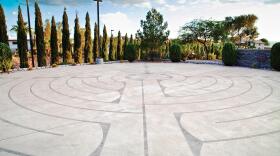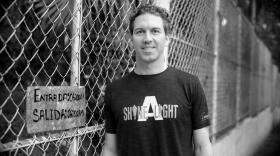Why are fewer American females than males into outdoor recreation, and why does it matter?
Everything changed for Toyya Mahoney late one evening in the spring of 2012, when she was sitting alone on a bench at the Katherine Landing amphitheater near the edge of Lake Mohave. She was a National Park Service seasonal employee there, one of few living onsite, and didn’t have much to do after the ranger program that had just finished. So she sat, looking at the moon, the lake, and — jolting her out of her reverie — a coyote walking by.
She remembered what her North Las Vegas family, for whom “getting outdoors” meant playing kickball with neighborhood kids in their cul-de-sac, had said when she told them she was moving to the Arizona desert for a job: “‘I don’t know how you’re going to go to the middle of nowhere. Aren’t you afraid? Do you need a gun?’” she recalls them saying. “They thought it was going to be this horror experience, like (the movie) The Hills Have Eyes. … They thought I was going to be attacked by coyotes.”
And now here she was, alone in the dark, with a coyote nearby.
“Before I could look again, it was gone — it had run all the way down to the water, and even when I first noticed it, it was probably at least 10 feet away,” she says. “In that moment, I learned that what my family had thought wasn’t true. It had shaped my reality and put fear in my mind, but it wasn’t true. I needed to figure out my own connection to the outdoors. That day had an impact on the rest of my life.”
Mahoney says that this connection and the NPS mentor who fostered it, Amanda Rowland, helped her through a difficult period that included the death of her mother. To maintain balance, she does what she calls “healing hikes,” treks to isolated places where she can leave her troubles on the trail, returning to the city with a lightened heart and fresh perspective.
And she helps others make the same connection. Over the past five years, she’s worked with several organizations to connect city dwellers and at-risk youth with the outdoors. Today, Mahoney volunteers with Natural Leaders and Outdoor Afro while working at the Bureau of Reclamation, where she’s learned about trail maintenance and environmental conservation. This month, she’ll put that knowledge to use in the All American Trails young leadership program.
Mahoney is exceptional. Some 143 million Americans participate in outdoor activities, according to the Outdoor Foundation’s most recent annual report. Of those, 54 percent are male, 46 percent female. Indoor fitness is much more popular than outdoor activities among women in Mahoney’s age group (21-25).
To understand why this is, outdoor retailer REI commissioned a study in January. Respondents — some 2,000 women ages 18-35 from across the U.S. — overwhelmingly said they believe the outdoors is conducive to good mental and physical health. Nevertheless, around seven in 10 said they wished they could spend more time in the outdoors, but can’t due to obstacles such as weather, time, and no one to go with them.
In addition to these practical barriers, the study identified several social factors. Around 60 percent of respondents said they face the same gender-related pressures in the woods as in the workplace, citing “be sexy,” “lose weight,” and “smile more” as common expectations.
“There’s so much focus on how we look and being thin, and there are so many unhealthy ways to get there,” says clinical psychologist Carli Snyder, who specializes in women’s mental health issues such as anorexia, anxiety, and depression. Snyder leads an early-intervention group called Girl Nation that aims to instill confidence and self-acceptance in teens before they fall victim to the unrealistic portrayals of women in commercial media.
Also, these images may clash with those of female adventurers. “In my experience, women are reluctant to embrace an outdoors identity,” says Ashley Lee, outdoor programs and community outreach coordinator for REI. “When you see the word ‘outdoorsy,’ it can have a negative connotation for women, because when you’re outdoorsy, you’re not pretty. You’re dirty and sweaty.”
While some outdoor sports may require trading makeup for gear, Mahoney believes there’s a place outdoors for females of all kinds, tomboys to girlie girls. She says women frequently arrive for Outdoor Afro hikes in color-
coordinated outfits, and she refuses to give up her own regular manicures, even when she’s working in the field.
“I think sometimes it’s just the newness and unfamiliarity of outdoor recreation,” she says. “They might want to try it but don’t know how. Or they’ll see a woman riding a bike and think, ‘She’s so advanced, I’ll never be able to keep up with her.’”
Snyder believes this is why it’s important that women be encouraged to try: to gain the confidence of tackling a challenge on their own, without the help of a man, and with the support of other girls and women.
Lee saw this in action last year when she participated in an all-women, nine-day road rally from Lake Tahoe through the outskirts of Las Vegas to San Diego.
“My experience had always been, ‘Beat out the next girl,’ but in this event there was so much love and appreciation,” she says. “There were so many times when people were knee-deep in rocks and mud, and we’d pull over, flip the hair up in a bun, and dig each other out. We’d whip out the wrenches and do what we had to do to get unstuck.”
Banding together is also a great way to avoid the real risks women take in the outdoors, which aren’t immune to sexual harassment and violence. Snyder stresses that there’s strength in numbers, and that confronting fears — just as Mahoney did — is deeply empowering.
“Think about what it would be like to complete an event you really want to do,” Snyder advises. “Try doing something with a friend, something challenging, but in a situation where you’re safe — with a group, or with a satellite phone. That way, you can push yourself out of your comfort zone, and that’s the only way we grow in life.”
Force to reckon with
Having studied gender disparity in outdoor recreation, REI is doing something to try to solve it. On May 6 the company launches a national effort to get more women outdoors. Called “Force of Nature,” it’s expected to inspire 1,000 events around the country, including a Las Vegas one at Skye Canyon housing development near Red Rock. Over the May 6-7 weekend, Friends of Nevada Wilderness, Outdoor Afro, and other community groups will lead a hike, camp-out, and bike ride, as well as educational sessions on topics like how to use a map and compass, and cook in a Dutch oven.
Outside also published a female-focused issue coinciding with REI’s “Force of Nature” news release. With a photo spread featuring ski racer Lindsey Vonn, swimmer Diana Nyad, and eight other iconic female outdoorswomen, the magazine implicitly tackles findings from the retailer’s January survey: namely, that nearly two-thirds of respondents couldn’t think of a female outdoors role model, and 60 percent believe men’s interest in outdoor activities is taken more seriously than women’s.
“We want to support women-specific groups and foster female leaders in the outdoors,” says REI’s Ashley Lee, who’s organizing the Las Vegas event. “This is the year of women’s empowerment and equality. We want to harness that and create an opportunity for women to come together and cause a shift in the outdoor industry.”










